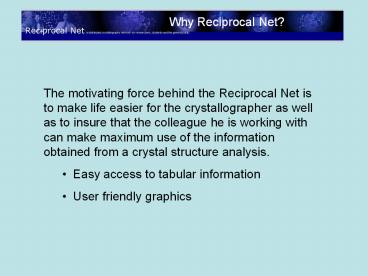Overview%20 PowerPoint PPT Presentation
Title: Overview%20
1
Why Reciprocal Net?
Overview Why Reciprocal Net?
- The motivating force behind the Reciprocal Net is
to make life easier for the crystallographer as
well as to insure that the colleague he is
working with can make maximum use of the
information obtained from a crystal structure
analysis. - Easy access to tabular information
- User friendly graphics
2
Current Status
- Today we have nearly 20 systems either on-line or
nearing on-line status, and the software is
remarkably stable. - The system is not only popular with the users of
the data, but has been widely recognized by
several major scientific organizations - One of top 50 Science and Engineering sites
(Scientific American) - Featured on NetWatch in Science
- Featured in Chemistry (ACS general public
newsletter)
3
Current Status
- Reciprocal Net Site Software 0.9.0 is currently
scheduled for release in July, 2005 - If time and resources permit, a minor upgrade
will be released in September, 2005 likely to be
labeled 1.0.0
4
Portal and Educational Content
5
Portal and Educational Content
6
Portal and Educational Content
7
Portal and Educational Content
8
Portal and Educational Content
9
What is a LIMS?
What does it look like?
Open a browser
10
What is a LIMS?
What is a LIMS?
- LIMS Laboratory Information Management System
- Records data about laboratory operations and
results - Supports workflow tracking, sample status
reporting, and other data-centric features
(depending on the particular LIMS) - The Reciprocal Net LIMS
- Designed for crystallography
- Workflow based
- Maintains permanent, complete history
- Stores selected miscellaneous data as well as
files
11
LIMS Basic Workflow
12
LIMS Data Structure
- Many data reside in a database on the server
- Per-sample data include arbitrary files supplied
by users - ALL data are versioned
13
LIMS New Samples
- When a new sample arrives in the facility, the
procedure is - Submit the sample into the Reciprocal Net.
- Collect some data and try to determine a unit
cell. - Either failed to collect for examinations or
collect preliminary data and enter unit cell
parameters, etc. - If the latter collect full data, solve
structure, early refinement. - Refine structure and submit preliminary files.
- Complete refinement, fill in the blanks in the
data mask, generate the graphics files and place
as many files in the repository as you want.
14
Release to Public
- When a structure has been published
- Perform the Release to Public action
- Perform an Add Citation action if there is a
citation
15
LIMS How the IUMSC benefits
Benefits
- Sample tracking
- What is its current status
- No more paper reports
- Quick access to summary data about
previously-determined structures - Search by unit cell parameters / volume
- Search by sample provider / submitter
- Search by (partial) sample number
- Search by responsible crystallographer
16
LIMS More Benefits
More Benefits
- Collaborating Chemists can do more for themselves
- Preparation of images
- Tracking their samples status
- Answering many structure geometry questions
- Ease of file exchange
- Files and data are accessible from anywhere with
a network connection.
17
LIMS More Benefits
The Graphics Files
In order for the graphics to appear in the
Reciprocal Net window, two files need to be in
the repository name.sdt and name.crt. The
first contains a list of the atoms in ORTEP
format, the second one a list of the atoms with
cartesian coordinates, connectivity, and some
other information. The generation of these two
files is a little weird.
18
Generating files for graphics
Overview Why Reciprocal Net?
If you have a straight-forward and clean
molecule with Z 1, and no disorders, the
process is relatively simple SHORTEP requires
only a simple knowledge of some simple
instructions and will proceed with not
problems. In many cases however, it is desirable
to have a series of name.crt and name.sdt files
to represent different moieties or ignore
disordered portions of a molecule. It might also
be desirable to have files in which only selected
hydrogen atoms are shown. XP allow to generate a
name.ins file that contains precisely those atoms
you want to see in the graphics application. The
program shel2sdt.exe can read shelx .ins format
and generate a file name.sdt, which can be read
by SHORTEP.
19
shortep.exe
Overview Why Reciprocal Net?
SHORTEP is a legacy program that was developed in
the IUMSC when there were few other options. The
name comes from the fact that it is a shortened
version of C. Johnsons ORTEP program. All of the
atom plotting instructions are removed, but the
atom manipulation routines are retained, and a
fair number of new manipulation and generation
options are added. Because we had standardized on
a hybrid of GENLES (LANL) and ORFLS (ORNL) input
formats, we were using (and still use) a unique
SDT format. This is the nnnn.sdt file that is
required for some of the graphics options in the
Reciprocal Net. The SHORTEP program can read an
SDT and generate additional SDTs as well as the
nnnn.crt files used in recipnet. The nnnn.crt
file is the other file format that was employed,
primarily to keep the file size minimized in the
system.
20
Generating files for graphics
Overview Why Reciprocal Net?
If one wishes to generate the files directly from
a .res or .ins file
nnnn.resfrom SHELX
nnnn.cif
nnnn.crt
shel2sdt.exe
shortep.exe
nnnn.sdt
Manipulate atoms if necessary for
differentfragments of interest.
21
shel2sdt
Overview Why Reciprocal Net?
shel2sdt.exe is a command line program that can
be used to create the name.sdt, which can be read
into shortep.exe. shel2sdt name.ins is all you
need to type.
22
SHORTEP
23
Lets have an example
Ylid Test Structure

